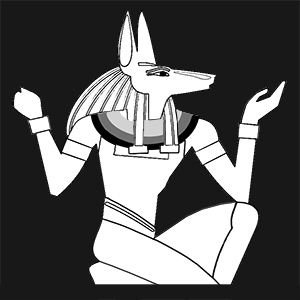An Offering for Revenge: Final
A Last Look.
Eilum’s vacant eyes stared into the morning sky. The officer looked down at the peaceful, almost joyful face — moments before he had covered up the festering abdominal wound. There surprisingly little blood since the pressure from his intestines pushing through the tear in his gut served to plug the wound.
A priest from the temple resisted the reflex to vomit. He had seen many bodies prepared for their journey West, but never one so lifelike.
It had been three days since the priest discovered the missing statue of Anubis. He only vaguely knew the young man who had stolen it. He didn’t want to cause trouble for him, but when the high priest learned of the theft, he was forced to contact the civil authorities to retrieve it.
A little further back, Si-Hotep sat up straight on his horse with his sons Kel and Una at his side. Si was all but too eager to find the missing man. Eager to inflict a punishment for the theft, a penalty many orders worse than the priest or officer could imagine. However, fate cheated Si of this pleasure, but according to the officer, not by much.
“If I had to guess, he hasn’t been dead for more than a few hours.”
“Considering the wound he has,” the priest added, then trailing off.
“He didn’t die from the wound.” The officer looked up. His words gathered the attention of all. “His belly has been festering for many days, much of the blood on and around him is dry. I would say he has been laying here for nearly three days.”
The group looked on in surprise. “How could he survive for so long like that?” Una asked in horror.
“I had seen many men brought back from the battlefield with wounds such as this cling to life for hours, even days before they were treated.” The officer answered with a solemn voice, as though it somehow honored the memory of the one laying before him. “Men can keep themselves alive through force of will. They focus on the memory of things they want to see again, their loved ones, or their homeland, in so doing, they find the will to continue living.”
“So you’re saying that he died because he gave up?” Si Hotep said with contempt.
“Not in so many words.” Came the answer, just short of spite. The officer held up a crushed waterskin. Every drop of moisture twisted from its husk. “This one fought for a long time to cling to life.”
“This makes no sense!” Una spoke up suddenly. “He steals a small wooden statue from the temple, a few meager provisions to come out here to slit his gut, then lay here suffering before a small campfire for three days until he dies? By the Gods WHY?!”
Only then did the priest notice the ashes before the statue. Recognizing the area as an altar, he quickly sniffed a pinch of the burnt resin, then fell back, swept away by a sudden wave of understanding. “By the Gods!”
“You can explain this?” The Civil Officer ordered.
“I remember this boy now!” There was shame in his voice, as though somehow he was ready to claim some small measure of responsibility for the horror he saw. “A few days ago, a younger one of my order asked about the offerings of wealth the temple received. He wanted to know if only the wealthy could show their faith to the gods, or if the meager offerings of grain and salt made by the poor were seen in the same way. I told him that one did not need great possession to honor the Gods. One can demonstrate faith through an offering of endurance.
“Rather than offer copper or gold, a prayer offered with fasting or other abstinence could carry great weight with the gods. Some have been known to walk great distances, barefoot, to show their faith. Many have endured great suffering, in hope that the gods will hear their prayer. That was when I saw this boy staring at me. He had the look of one who just looked into the face of salvation.” The priest held tightly to the small wooden likeness of the jackal-headed god.
“Are you telling me that this boy, came all the way out here in the desert, cut his belly open, then laid suffering for three days and nights, only to be dried by the sun, that his prayer might be heard?” The officer asked. The idea surprised and disgusted him at the same time.
Una had climbed off his horse and moved to gather the remains of Eilum. He didn’t have a clue where to begin, afraid that his step brother’s insides would spill onto the ground before him if he moved him filled his mind.
“Leave him.” Si-Hotep’s order was stern yet calm.
Una looked up in surprise. “I can bury him in the sands of the desert father, the sands will help preserve his body, and there will be a chance for him to travel to the next life.”
The priest offered Una the statue. If you wish, you may bury this with him that he might take the likeness of the one he honored in his final hours with him into that which follows.
“No!” Si-Hotep’s voice was not loud, but it was firm.
His words were final. As master of the dead’s house, he had the right to decide what would happen to the remains. His words also set the officer and priest on their horses, wanting desperately to put as much distance between themselves and this vulgar family. Una also mounted his horse, knowing better than to challenge his father.
As they brought the horses about, the priest turned to the constable in a muted voice. “You said that you had spent time on the battlefield, please tell me, what dream could sustain someone with such a horrible wound for so many days, yet leave them with such a look of serenity?”
The officer considered the question for a time. “I really can’t say.” His voice was distant. He was angry at the uselessness of it all “Perhaps you can tell me what kind of prayer one could offer the gods that require such an offering.”
The priest felt devastated. “The kind that is usually answered.” In silence, he told himself that if the young one had returned the statue to the temple, his order could have offered him an alternative. The truth was, however, he knew full well how the young Hittite lived. He told himself that it was not his place to get involved. It was out of shame that he spoke up next.
“Master Hotep, nothing is served by leaving this one here. Please allow us to return him to the temple. We can give him some measure of preparation for the journey his ka will take. I promise it will not cost you a thing.
Si tried to contain his delight. He was not a smart man, but he did have some sense of what the priest was feeling. He fought back a smile as he answered him. “I helped raise this one; I feel the loss as if it were a member of my own house.” His mock sincerity flowed like grease dripping from a cooking duck. “However, I cannot ignore the fact that his last act was to defile your temple by stealing one of your treasures. I think it fitting to leave him here for the jackals to feast upon.”
Si turned for a final look at the place where the remains of Eilum laid. A large black jackal was making its way down the hillside. He had been watching the hound, looking down from the small hilltop as the others talked, waiting for the feast to be left alone.
“Let us consider this an offering to the God Anubis, whose temple he defiled with his hearsay.”
A slight smile flashed across Si’s face, one that sent the constable and priest ridding off ahead in disgust.
The sons of Hotep listened in silence as their father chuckled under his breath. As they turned towards home, a solum, high-pitched voice floated to their ears from the place where the jackal began to feed. The words were soft and brief but thundered with the power of wisdom that was eternal — words that they would all vividly remember for the rest of their lives.
“I accept the offering.”

